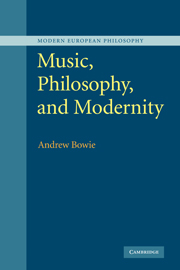Book contents
- Frontmatter
- Contents
- Preface
- Introduction
- 1 Form, feeling, metaphysics, and music
- 2 Music, language, and the origins of modernity
- 3 Rhythm and Romanticism
- 4 Hegel, philosophy and music
- 5 Music and the subjects of Romanticism
- 6 Music, freedom, and the critique of metaphysics
- 7 Pro and contra Wagner
- 8 Music, language, and being: Wittgenstein and Heidegger
- 9 Adorno: musical philosophy or philosophical music?
- Conclusion
- References
- Index
7 - Pro and contra Wagner
Published online by Cambridge University Press: 15 October 2009
- Frontmatter
- Contents
- Preface
- Introduction
- 1 Form, feeling, metaphysics, and music
- 2 Music, language, and the origins of modernity
- 3 Rhythm and Romanticism
- 4 Hegel, philosophy and music
- 5 Music and the subjects of Romanticism
- 6 Music, freedom, and the critique of metaphysics
- 7 Pro and contra Wagner
- 8 Music, language, and being: Wittgenstein and Heidegger
- 9 Adorno: musical philosophy or philosophical music?
- Conclusion
- References
- Index
Summary
The Wagner problem
In Search for a Method Sartre says of Paul Valéry that he is ‘a petitbourgeois intellectual, no doubt about it. But not every petit-bourgeois intellectual is Valéry’ (Sartre 1968: 56). The case of Richard Wagner gives us the analogous ‘Wagner was a resentful, vicious anti-Semite, but not every resentful, vicious anti-Semite was Wagner.’ In the light of the Holocaust it is, however, not enough to leave it at that. Anti-Semites in nineteenth-century Germany – who included a significant proportion of the German population, including Karl Marx – should not be equated with real Nazi perpetrators or fellow-travellers, but neither should they be seen as wholly blameless. At the same time, even though context cannot excuse everything, one should take account of the differing performative effects of texts and artworks in differing historical situations. What does make Wagner a real problem in relation to the questions posed by the present book is his main contribution to the ideology of the Holocaust, the reprehensible essay, ‘Judaism in Music’ (1850), which he insisted on re-publishing and explicitly defending against criticisms in 1869, thereby compounding the damage. The effects of the essay's odious contentions persist into the Nazi period, when Jewish music is banned because it was supposed to involve a ‘Jewish’ musical essence of the kind Wagner invokes in the essay.
Were it not for Wagner's anti-Semitism in this essay and other writings, such as the essay ‘Modern’, there would be little reason to regard the intense controversy generated by his work as meaning that it should be rejected as morally indefensible, even where it is anything but morally attractive.Das Rheingold, for instance, is remarkable for having not one character who is in any way admirable.
- Type
- Chapter
- Information
- Music, Philosophy, and Modernity , pp. 210 - 260Publisher: Cambridge University PressPrint publication year: 2007



